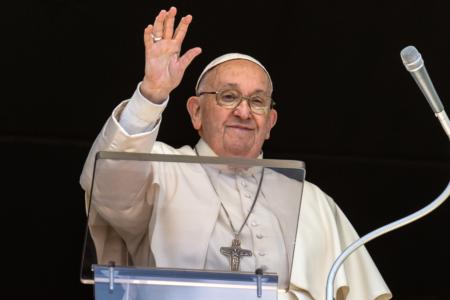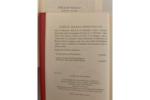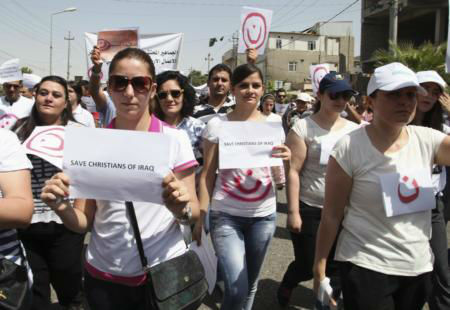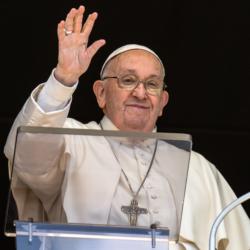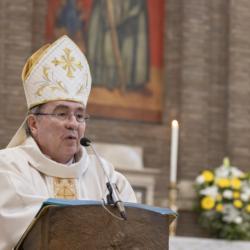Religious genocide In Iraq?
Last week the Vatican's Pontifical Council for Interreligious Dialogue issued an extraordinary statement about the situation in Iraq. There, in the name of Islamic religion, a group of jihadists is attempting to restore the Caliphate by forcefully suppressing other religions. President Barack Obama has rightly authorized American bombing to protect the persecuted Yazidis, but has not addressed the similar situation of the Christian minority in Iraq.
Pope Francis spoke up forcefully on their behalf at an Angelus address in July: "[O]ur brothers and sisters are persecuted, they are pushed out, forced to leave their homes without the opportunity to take anything with them. To these families and to these people I would like to express my closeness and my steadfast prayer. Dearest brothers and sisters so persecuted, I know how much you suffer, I know that you are deprived of everything. I am with you in your faith in Him who conquered evil!"
The statement of the Pontifical Council for Interreligious Dialogue had a detailed catalogue of shameful behavior. "Despite most Muslim religious and political institutions contesting that 'restoration,' it has not prevented the jihadists' 'Islamic State' [calling itself ISIS] from committing and continuing to commit unspeakable criminal acts:
"--the slaughter of people solely because of their religious beliefs;
"--the abhorrent practice of beheading, crucifixion and hanging corpses in public places;
"--the choice imposed on Christians and Yazidis between conversion to Islam, payment of tax (jizya) or exodus
"--the forced expulsion of tens of thousands of people, including children, the elderly, pregnant women and the sick;
"--the kidnapping of girls and women belonging to the Yazidi and Christian communities as war booty;
"--the imposition of the barbaric practice of infibulation;
"--the destruction of places of worship and Christian-Muslim mausoleums;
"--the forced occupation or desecration of churches and monasteries;
"--the removal of crucifixes and other Christian religious symbols and those of other religious communities;
"--the destruction of the invaluable Christian religious and cultural heritage;
"--the abject violence that terrorizes people into surrendering or fleeing."
What are we to make of such abominable behavior in the modern age? Crucifixions, beheadings, ostensibly in the service of religion? As the Vatican correctly notes, "No cause can justify such barbarity and certainly not a religion. This is an extremely serious offense to humanity and to God who is the Creator, as Pope Francis has often said."
The background, of course, is that, as the Council observes, "Christians and Muslims have lived together -- it is true with many ups and downs -- over the centuries, building a culture of friendliness and a civilization of which they are proud. Moreover, it is on this basis that in recent years, the dialogue between Christians and Muslims has continued and deepened."
The Catholic Chaldean Patriarch of Babylon and President of the Catholic Bishops in Iraq on August 13, 2014 urged the United States, the European Union and the league of Arab countries to "clear the Nineveh plain from all the elements of Jihadist Warriors and help these displaced families return to their ancestral villages and reconstitute their lives so that they can conserve and practice their religion, culture and traditions...If the situation does not change the whole world should take the responsibility of a slow genocide of a genuine and entire component of Iraqi Society and of losing its heritage and age-old culture. ISIS tries to erase all traces!"
As the Pontifical Council concludes: "The plight of Christians, Yazidis and many other religious and ethnic minority communities in Iraq demands a clear and courageous stance on the part of religious leaders, especially Muslims, those engaged in interfaith dialogue and everyone of goodwill. All must be unanimous in condemning unequivocally these crimes and denouncing the invocation of religion to justify them. Otherwise what credibility will religions, their followers and their leaders have? Even after patiently pursuing interreligious dialogue in recent years, what credibility will there be?"
DWIGHT G. DUNCAN IS PROFESSOR AT UMASS SCHOOL OF LAW DARTMOUTH. HE HOLDS DEGREES IN BOTH CIVIL AND CANON LAW.
- Dwight G. Duncan is professor at UMass School of Law Dartmouth. He holds degrees in both civil and canon law.
